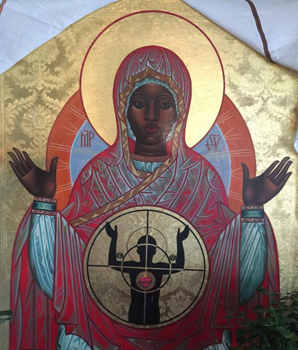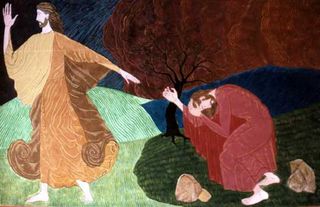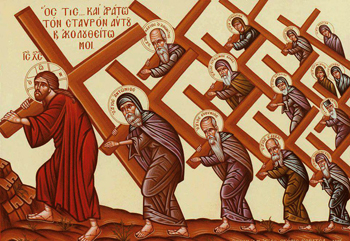For Sunday February 25th, 2018
Second Sunday of Lent
Lectionary Readings (Revised Common Lectionary, Year B)
Genesis 17:1-7, 15-16
Psalm 22:23-31
Romans 4:13-25
Mark 8:31-38
Scott. Alyssa. Martin. Nicholas. Aaron. Jaime. Christopher. Luke. Cara. Gina. Joaquin. Alaina. Meadow. Helena. Alex. Carmen. Peter. These are the names of the seventeen people — fourteen students and three faculty members — who died in a mass shooting this week at the Marjory Stoneman Douglas High School in Parkland, Florida. Alyssa, fourteen years old, was a star soccer player. Cara loved the beach. People often spelled Joaquin’s name wrong, so he had a snappy nickname: “Guac.” Meadow worked after school at a motorcycle repair business. Scott and Aaron, both faculty members, died to protect their students.
According to the New York Times, three of the deadliest mass shootings in modern U.S history have occurred in the last five months. Since the Sandy Hook shooting of 2012, over 1800 people have died and close to 6500 others have been wounded in 1600 mass shootings across the country. Right now, Americans own over 300 million guns — roughly one for every citizen. Every time another mass shooting hits the headlines, we gather as a nation — over social media, at memorial services and vigils, in the halls of Congress and the White House — and offer the victims and their families our “thoughts and prayers.” And then life goes on — until the next shooting.
During weeks like this one, I find it hard — honestly — to focus on the lectionary. I struggle to keep trusting that the ancient words we hold up as sacred actually matter in the real world. But then I recall what Peter — in a rare moment of insight and clarity — said to Jesus two thousand years ago: “Lord, to whom shall we go? You have the words of eternal life.”
In this week’s Gospel reading from St. Mark, Jesus predicts his death for the first time. “The Son of Man must undergo great suffering,” Jesus tells his disciples quite plainly. He must “be rejected by the elders, the chief priests, and the scribes, and be killed, and after three days rise again.”
 |
Standing on this side of resurrection history, we too easily miss the bombshell effect these words must have had on Jesus’s disciples. Their great hope, cultivated over the three years they had followed Jesus, was that he would lead them in a military revolution and overthrow their Roman oppressors. After all, they had seen his miracles, and witnesssed firsthand his charismatic ability to draw huge crowds. They had heard him proclaim loud and clear the arrival of a new kingdom. He was their longed-for future. Their cherished dream. So what could be more disorienting, more ludicrous, than the news that their would-be champion was determined to walk straight into a death trap? To surrender without a fight to a common criminal’s death?
You know the rest of the story. Peter — in a more typical moment of loud-mouthed bumbling — scolds Jesus for his macabre prediction. And Jesus, in what might be the sharpest and most surprising rebuke in all of Scripture, puts Peter in his place with one swift stroke: “Get behind me Satan! For you are setting your mind not on divine things but on human things.” Then Jesus turns to the crowds and captures the essence of his message in two sentences: “If any want to become my followers, let them deny themselves and take up their cross and follow me. For those who want to save their life will lose it, and those who lose their life for my sake, and for the sake of the gospel, will save it.”
I don’t know about you, but I can relate very well to Peter’s unease about this hard, hard teaching. Even now, centuries removed from the context in which Jesus lived and taught, I shiver as I consider the implications of his words. What exactly was he saying? That he wants us to pursue suffering and death? That a holy life is not about living at all, but about dying? About martyrdom?
One temptation is to minimize. “I’ll give up chocolate for Lent,” I say. Or deny myself Facebook and Youtube for a few weeks. I’ll pray more, study more, tithe more, volunteer more. All good and necessary things, no doubt. But not, I think, what Jesus meant when he invited the crowds to lose their lives for the sake of the gospel. Not what he rebuked in the strongest possible terms when Peter tried to replace Jesus’s cross with a shortcut.
 |
The other temptation is to maximize in the wrong direction. To become, as the expression goes, “so heavenly minded that we’re no earthly good.” This is the kind of self-denial that strips life of all pleasure, all embodiment, all celebration, all joy. The single-mindedness that reduces the world to a grim mission field, a landscape to conquer with an earnest but ultimately loveless zeal. It is the dangerous kind of self-denial that encourages people to stay in abusive relationships, and perpetuate their own victimhood. I don’t believe that this is what Jesus meant, either. I can’t recognize in it the Jesus who frolicked with children, the Jesus who turned water into wine, the Jesus who advocated for the widow, the orphan, the prisoner, the outcast.
So what then? What does it mean to deny myself? Living, as I do, in a culture that doesn’t imprison, torture, or kill Christians for our faith, how shall I deny myself so that the gospel might thrive, here and now? How shall I save my life by losing it for Jesus’s sake in 21st century America? How shall I die?
This week, I have asked myself these questions in light of the tragedy in Florida, and I’ve been struck hard by one realization: I live in such crippling fear of suffering and death that I use up a huge amount of my mental, spiritual, and physical energy each day trying to stave off both. To be fair, contemporary western culture encourages me to do this. What would Jesus say, I wonder, to the multi-million dollar industries that invite me to deny my mortality through cosmetics, fashion, leisure, sex, entertainment, real estate, sports cars, weight loss, beauty? What would he say to a culture that glorifies violence but cheapens death? What would he say to my own frightened heart, that priorities self-protection over so much else that matters in this life? What if Jesus’s call is for us to stop clutching at this life so desperately? To step out of the vicious cycles of denial, acquisition, terror, and violence that seek to cheat death, but in fact rob us of the abundant life Jesus came to give us?
What, after all, does a citizenry that owns 300 million guns have to say about fear? About enslavement to fear? What would it look like, in this time and place, to lay down our fears so that others might live? To willingly set aside our own interests and (dare I say it?) our own rights, so that we could prioritize what Jesus called the great commandments: to love God and love our neighbors as ourselves?
 |
I started this essay with the names of those who died in Florida this week. I’m ashamed to admit that I had to force myself to look up the names and stories when news of the shooting went viral on Wednesday afternoon. My first reaction — after maybe five seconds of horror — was numbness. As in, “Been there, done that.” As in, “Nothing I feel makes any difference, anyway, so why bother?” As in, “I just can’t take it in anymore; it’s too painful.” That’s when I realized how urgently I needed to look up these precious people’s names, and linger over the details of their cut-off lives. How much I needed to fight against a lethargy borne of terror and despair.
To take up a cross as Jesus did is to stand, always, in the hot white center of the world’s pain. Not just to glance in the general direction of suffering and then sidle away, but to dwell there. To identity ourselves wholly with those who are aching, weeping, screaming, and dying. Taking up the cross means recognizing Christ crucified in every suffering soul and body that surrounds us, and pouring our energies and our lives into alleviating that pain — no matter what it costs us. In the case of our American epidemic of gun violence, it means moving beyond the Band-aid approach of “thoughts and prayers,” and deciding, as a Church, as Jesus’s body on earth, as Christians committed to peace, justice, and human flourishing, that we will not tolerate this desecration of life in our schools and our cities anymore.
How shall I die? Accepting — against all the lies of my culture — that I will die, and trusting in Jesus’s assurance that I will also rise again, how shall I spend this life? Shall I hoard it in fear, or give it away in freedom? Shall I protect myself with numbness and apathy, or experience the abundant life Jesus offers to those who ache, weep, and bleed alongside the world’s suffering? This is the question I'm asking in my Lenten wilderness: how shall I die?
Image credits: (1) The Nebraska Episcopalian; (2) Interrupting the Silence; and (3) Greek Community of St. George, Brisbane.





